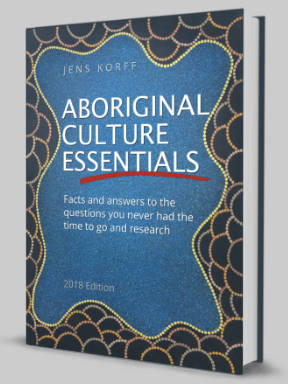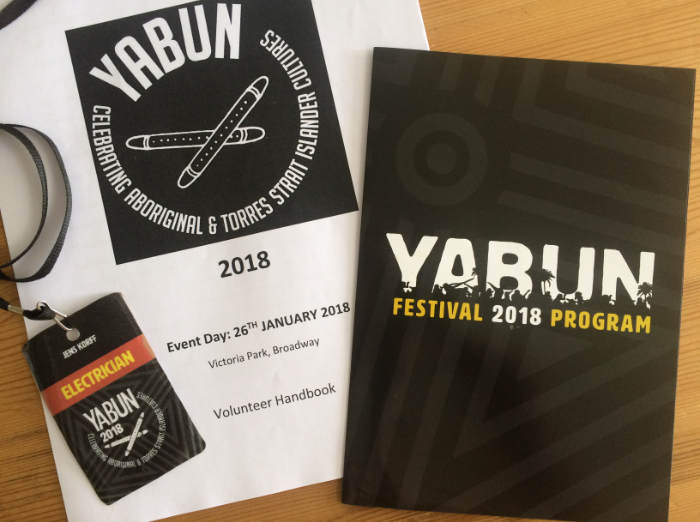People
5 steps towards volunteering & engaging with Aboriginal communities
Many informed people want to help and work with Aboriginal communities. This guide helps you prepare, engage, and find resources and contacts for volunteer jobs.

Wishing you knew more about Aboriginal culture? Search no more.
Get key foundational knowledge about Aboriginal culture in a fun and engaging way.
This is no ordinary resource: It includes a fictional story, quizzes, crosswords and even a treasure hunt.
Stop feeling bad about not knowing. Make it fun to know better.

Where do you start to help & volunteer in Aboriginal communities?
I'm wondering if there is anything positive 'on the ground' I can do to help my local Aboriginal communities and where I might find resources and contacts for possible volunteer work?
— Derek
The only thing I miss – or couldn't find so far – is how to get personally involved, e. g. finding interesting events like discussions, aboriginal festivals or so.
— Hermine
Do you have the same question as Derek and Hermine? You want to know where to start to engage and work with communities? Are you frustrated because you cannot find resources and contacts for volunteer jobs in Aboriginal communities?
Here's a guide how to find ways to prepare yourself to engage with and help Aboriginal communities and organisations. You don't necessarily need to look to volunteer in remote Australia – often it's easier and more rewarding for you to help locally.
But before you start there's a little homework to do.
Step 1: Some homework and introspection
Before you venture out it's a good idea to review where you're at and be totally honest with yourself in your answers.
Here's a checklist you can print and work through:
1) Evaluate your pre-conceived ideas
- Do you hold stereotypes, prejudice, or racist views?
- Become aware of your current thoughts, opinions and preconceptions about Aboriginal people.
- Are you willing to see life from someone else's perspective?
- Do you have certain beliefs and ideas you want to challenge?
2) Develop awareness and interest
- Be observant and willing to learn.
- Visit local Aboriginal cultural centres or contact your local council.
- Explore your local area's history and the culture of the local Aboriginal community.
- Watch educational programs (e.g. NITV, SBS - TV or online).
- Visit your local library and research online about questions you have.
- Check maps and get to know the Aboriginal language groups in your area and some of the history of those groups.
- Find out which Aboriginal group's country you live and work on.
3) Practice respect
- Respect is very important in every social structure in Aboriginal communities.
- Respect for Elders, the land, animals and ancestors are fundamental aspects of Aboriginal culture.
- Aboriginal people will subtly test how respectful you are before they trust you more.
- Role-play with your partner or a friend how you would approach an Aboriginal person, then ask them how they felt.
4) Can you ask for advice?
- Your ability to ask for advice regarding cultural matters is very important.
- You'll need to learn protocols (e.g. about gender division, greetings, speaking and listening. Note that protocols depend on geography.
- For more remote communities, read Whitefella Culture by Susanne Hargrave.
5) Attend events and activities
- Find out about significant Aboriginal days.
- Attend festivals, events and activities to get to know your local Aboriginal community.
- Start building relationships with people at the event with a friendly, informal chat.
- Aboriginal culture has a greater emphasis on relationships, so approach events with the intention to connect and build relationships.
- Contact your local council to find out about events near you.
Step 2: Get to know your local Aboriginal community
Now that you have some background knowledge it's easier for you to attend events without feeling ashamed because you don't know enough.
- Look for your local community rather than remote communities. Urban Aboriginal identity can be just as strong, with powerful territorial affiliations.
- Attend community events and meetings as a guest and practice to just listen.
- Participate in Aboriginal tours of your area. Show interest and ask questions.
- Use these opportunities to practice your homework from Step 1.
- If you do not have any contacts or direct links with your local Aboriginal community, a good starting point is to contact either your Local Aboriginal Land Council (LALC) or local Aboriginal education organisation.
Useful links:
- Aboriginal Land Councils
- New South Wales Aboriginal Education Consultative Group
- Victorian Aboriginal Education Association
- Queensland Aboriginal and Torres Strait Islander Foundation
- Larrakia Nation – Darwin's traditional owners (NT)
Step 3: Make contact with your local Aboriginal community
Time to meet community members and start building trust and your network. Some of the following points are more related to organisations. If you venture out by yourself just do a scaled-down version.
- Meet local Aboriginal people and explain who you are, what you do and why you’re interested to learn more.
- Respect the hierarchies you find.
- Invite local Aboriginal organisations/elders for a morning tea and talk about historical information regarding the local area.
- Do an Acknowledgement of Country at the start of activities.
- Ask an Aboriginal person to do a Welcome to Country at ceremonies and official events.
- Treat people as friends rather than clients.
Step 4: Start a deeper conversation
After an initial contact you can share more about you. Remember not to be pushy but humble: First it's your turn to share and give before you can receive.
- Share about where you and your family come from, and note whether this personal sharing is reciprocated.
- Dare to be vulnerable by opening yourself to the other person and offering a heartfelt connection.
- Come as an equal and not in a dominant, paternalistic or thoughtless way.
- Be willing to share your life and family as well.
Step 5: Become involved
Now you are ready to offer your help. There are some people who know something about you and, ideally, you have received some trust and sharing in return.
- Offer your skills, talents and time to help Aboriginal communities in your area, e.g. by volunteering your time and know-how (see below for links to volunteer jobs and organisations).
- Many Aboriginal events need volunteers as well (e.g. Survival Day celebrations).
- Work with activist groups, e.g. Australians for Native Title and Reconciliation (ANTaR), Stop The Intervention Collective Sydney (STICS).
- Join a reconciliation group (see below for links).
- Check with your employer if they offer secondments within their Reconciliation Action Plan.
Remember: Always ask and offer, don't recommend or propose.
Double and triple check any permissions you have received. Sometimes what is permitted depends on who you are talking to and where and when you have the conversation. Versions might change from one day to the next. [1]
Case study: Skilled volunteering secondments at NAB
NAB employee, Wendy Kelly, shares her story about secondment in Kunanurra with Jawun and the overall vision of their work in the East Kimberley region.
Useful links for volunteer work and to reconciliation groups
Links to volunteer work
- Indigenous Community Volunteers matches skilled volunteers to projects in Aboriginal communities
- The Aboriginal Benefits Foundation has a focus on supporting health and education projects with a connection to Aboriginal art and/or artists.
- Australian Indigenous Mentoring Experience aims to boost year 10, year 12 and university admission rates for Aboriginal Australian students.
- The Aboriginal Education Consultative Group is an Aboriginal community-based organisation of volunteer members. These groups advise on issues relating to Aboriginal education.
- Australians for Native Title and Reconciliation (ANTaR) runs an Australia-wide volunteer network to enable greater education and community outreach.
- The Aboriginal Legal Service offers law students the opportunity to volunteer with their Care and Protection or Family Law Practice.
- Go Volunteer is an organisation that offers a large range of volunteer roles including one-off, short-term and long-term opportunities. On their site you can find volunteer roles that suits your interests, motivation, availability and location.
- The Centre for Volunteering is a national not-for-profit organisation that supports volunteering and community participation with a focus on NSW. It provides referrals, advice, training, research and helps engage people through community involvement and volunteering activities.
6 million Australians volunteer each year.
About Indigenous Community Volunteers
Links to reconciliation organisations and groups
- NSW: www.nswreconciliation.org.au
- VIC: www.reconciliationvic.org.au
- SA: www.reconciliationsa.org.au
- QLD: www.rqi.org.au
- WA: Reconciliation Western Australia (Facebook)
There are currently no reconciliation organisations in the Northern Territory, ACT or Tasmania.
Other contact points
Here are some ideas who to contact within your local area:
- Aboriginal Community Liaison Officers
- Aboriginal Education Officers
- Community workers
- Aboriginal Heritage Office
- Aboriginal colleagues at work
- Committees or Elders from your local area or the wider region
- Non-Aboriginal people in your area who have already become familiar with appropriate protocols